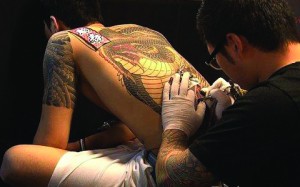Body art accepted by some, tolerated by others; questionable for professional jobs
In the last issue of The Horizon, the modern popularity of tattoos was evidenced in the article “Artistic Expression of Body.” Students and faculty alike were featured showing off their tattoos, and it is safe to say that numerous other students at IU Southeast sport ink.
Today about 4 in 10 people between the ages of 18 and 29 have at least one tattoo according to a Pew research study.

Because college students look to enter the workforce after graduation, the effects the popular trend has on career potential could be of concern.
These days, with almost half of the population sporting tattoos, is having a tattoo still taboo in the workforce?
Jay White, dean of the School of Business, said tattoos are becoming more accepted in the professional world, but exercising discretion is still necessary.
“It is true that tattoos and other lifestyle expressions such as body piercings are more accepted than they used to be,” White said. “However, before anyone runs out to get a face tattoo, I’d advise them to pay attention to the word ‘generally.’”
White said that while some work circles are accepting of tattoos, others are not. There are certain professions where tattoos could be detrimental to a person’s career, he said.
Lynn Prinz, assistant director of the Career Development Center, agrees.
“What I would tell a student body is it’s your choice [to get a visible tattoo], but you are limiting yourself,” she said. “You are limiting yourself for particular employers.”
Prinz, too, said she thinks the landscape concerning tattoos in the workplace is changing, but for some professions she thinks it will not change.
Executive career coach Meredith Haberfeld listed the professions that are generally more accepting of tattoos and which are not in an article on marketplace.org. Military, athletics, music, digital media, film and styling were all fields she said were accepting of tattoos. Jobs in business, government, education, medicine and law are generally not accepting, she said.
Both White and Prinz said that tattoos are an issue because of the role appearance plays in a professional atmosphere.
About 37 percent of human resources managers cited tattoos as the third physical attribute most likely to limit career potential, after non-ear body piercings and bad breath, according to a study conducted by careerbuilder.com.
Prinz explained that the main concern is for clientele. She said employers won’t hire anyone that their clients or customers could potentially view as unprofessional.
“An employer can’t take the chance of losing revenue over what the client is going to think,” Prinz said.
This stands true for the self-employed, as well, White said. Even if a person owns his/her own business, White said that person “wouldn’t want to ignore the power associated with a first impression.”
“Like it or not, appearance is still a major component in first impressions,” White said.
Because of this issue, some professions have policies concerning tattoos and body piercings. Nursing is one of these professions.
Jacquelyn Reid, interim dean of nursing, said that hospitals enact policies that require nurses to have tattoos covered up while in uniform.
IUS nursing students are required to cover up any visible tattoos while in the clinical setting by using a large Band-Aid, Reid said.
“This is primarily because many patients have preconceptions about people with tattoos, and we don’t want anyone viewing someone as having less professional behavior because they have a tattoo on their arm,” she said.
White had several suggestions for students entering the professional world with existing tattoos or those looking to get one.
“A tattoo is definitely a long-term commitment so everyone needs to ask some important questions beyond the ‘where’ and ‘what’ of a tattoo,” White said. “What profession do you plan to go into? What are you trying to say with the tattoo? Will that tattoo give the kind of first impression that is appropriate for your chosen career? Are you sure you’re going to stay with that career for 20 or more years? Things change.”
White also said he suggests anyone planning to pursue a career in the business world avoid any kind of body art that cannot be easily hidden on the job; personal expressions such as tattoos should be kept out of job interviews and social networks because “employers, customers, and clients look at these things and form an impression.”
By SAMANTHA FRAZIER
Features Editor
sefrazie@ius.edu


